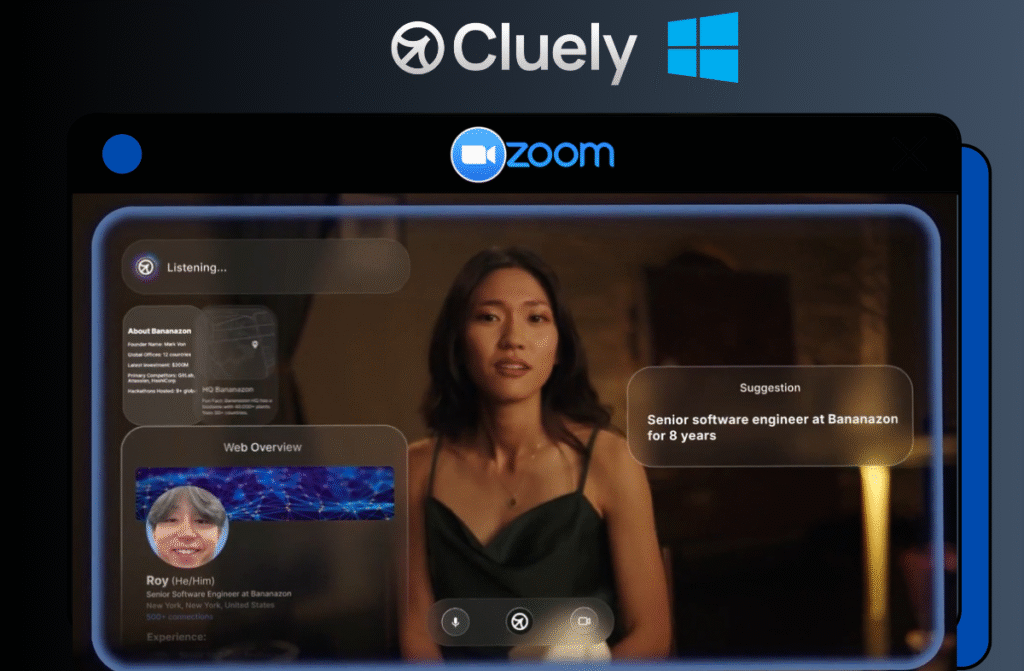
A New AI tool called Cluely is going viral which promises to help users “cheat on everything” from job interviews to sales calls.
The startup, which recently secured significant funding, markets itself as an “undetectable AI-powered assistant” designed specifically for various professional scenarios, including Zoom meetings.
What is Cluely AI?
Cluely is an AI-powered assistant developed by former Columbia University students that operates as an invisible helper during video calls, interviews, and other interactions.
Cluely is out. cheat on everything. pic.twitter.com/EsRXQaCfUI
— Roy (@im_roy_lee) April 20, 2025
The software works by creating a hidden browser window that remains undetectable to the person on the other end of the call, allowing users to receive real-time AI assistance without the other party knowing.
The startup was founded by 21-year-old Chungin “Roy” Lee, who serves as CEO.
The startup gained viral attention after Lee shared on social media that he had been suspended from Columbia University after developing a tool to cheat on software engineering job interviews.
Features of Cluely AI
Cluely offers several key features that make it attractive to those looking for an edge in professional settings:
- Hidden AI assistance during video calls and interviews.
- Undetectable operation that works with screen sharing software.
- Integration with platforms like Zoom and other collaboration tools.
- Real-time suggestions and answers during conversations.
The company claims its software is “completely undetectable to any software that can see your screen,” giving users confidence that their use of AI assistance won’t be discovered.
Recent Fundings
Recently, Cluely announced it had raised $5.3 million in seed funding from Abstract Ventures and Susa Ventures.
According to Lee, the AI cheating tool has already surpassed $3 million in Annual Recurring Revenue (ARR) earlier this month, suggesting significant market demand despite ethical concerns.
Cluely has published a manifesto comparing itself to other technologies like calculators and spellcheck, which were initially criticized as “cheating” but later became standard tools.
How to Download Cluely AI on Windows and Use it with Zoom
To use Cluely with Zoom:

- Visit the Cluely.com and sign up for an account.
- Download the Cluely AI for Windows application for your operating system.
- Install and launch the application.
- Configure your preferred settings and programming language in the settings page.
- When using Zoom, enable “Advanced capture with window filtering” in Zoom’s video settings.
- Use the global shortcuts provided by Cluely to activate the AI assistant during your calls
- Limit your screen share frames-per-second in Zoom settings for optimal performance
Pricing
Cluely offers a free tier that allows users to try the service, though with limited functionality. The free version restricts access to the latest AI models and only shows partial responses.
For full access to all features, users need to upgrade to a $20 paid subscription.
Limitations
Despite its impressive capabilities, Cluely does have several limitations:
- The technology may not always provide perfect answers, as demonstrated in their promotional video where the AI gave incorrect information during a date scenario.
- There are significant ethical concerns about using such technology to misrepresent knowledge or skills.
- Use of such tools may violate terms of service for employment interviews or educational assessments.
- Users may face disciplinary action if discovered using the tool, as happened to the founders themselves.
Conclusion
Cluely represents a controversial development in AI technology that raises important questions about authenticity, honesty, and the future of professional interactions.
While its founders position it as simply the next iteration of technological assistance like calculators or spellcheck, critics compare it to dystopian scenarios from shows like “Black Mirror.”
Whether Cluely becomes a widely accepted tool or faces pushback from institutions and businesses remains to be seen.